Growing the Jewish Bloc for Palestine
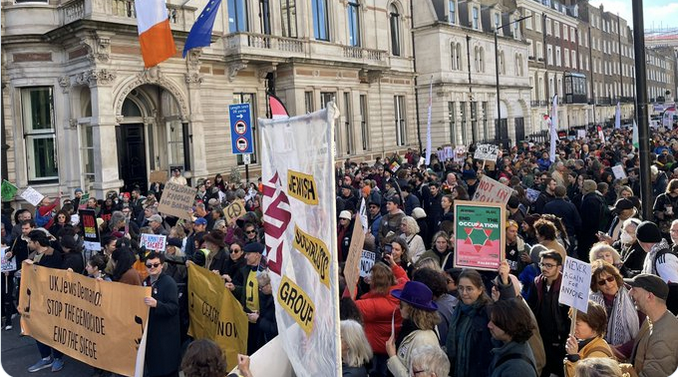
JVL Introduction
We are pleased to share this account of developing the growing intergenerational Jewish Bloc for Palestine, for justice, rights and freedom. The Jewish Bloc on the national marches calling for a Ceasefire Now! is warmly welcomed by all. Bard and Rosenberg contrast the Jewish Bloc against the bombardment with the approach of the Jewish Establishment. In common with more and more Jews throughout the world, progressive, anti racist Jews in the UK are standing loud and proud and saying “Not In Our Name”. Through common action for justice for all, our strength will grow and our links with our Muslim comrades and the many others who face discrimination will be deepened; together we are determined to make the change we all need.
LL
This article was originally published by Morning Star on Sat 23 Dec 2023. Read the original here.
For your freedom and ours
JULIA BARD and DAVID ROSENBERG explain how weekly pro-Palestine demos have seen a distinct Jewish bloc coalesce in solidarity with Gazans and in opposition to all forms of racism
Handing out leaflets is rarely a rewarding experience. People look past you, through you, up into space… and every so often someone accepts one and stuffs it in their pocket. But those of us in the small Jewish bloc on the demonstration for Palestine on October 14, a week after the Hamas attack on southern Israel, were astonished that people looked us in the eye, thanked us for our leaflets and read them.
As Jewish Socialists’ Group members with a long history of supporting the Palestinians, we were horrified at the attack by Hamas fighters on civilians in southern Israel on October 7. We were grief-stricken for the civilian victims and fearful for the Gazan people. We knew that Israel’s military response would be indiscriminate, disproportionate and motivated by revenge and racism against everyone in the Gaza Strip.
Just how disproportionate, we found out a day later, when Israeli Defence Minister Yoav Gallant announced that Israel would impose a total blockade of the Gaza Strip, cutting off electricity, food and fuel. He said: “We are fighting human animals and we are acting accordingly.”
Our leaflet, which emphasised the danger facing all the inhabitants of Palestine and Israel, was headed “Coexistence or No Existence. End Occupation. End Apartheid.” We were gratified that this received such a positive reception by protesters just a week into the war.
For many years a few Jewish organisations and individuals have formed an identifiable Jewish bloc on anti-racist demonstrations and in solidarity with the Palestinians. We have always been welcomed (sometimes too unctuously by people who think it is “marvellous” to see Jews supporting other oppressed peoples). But many of us felt trepidation about how our presence would be perceived on the first protests after the Hamas attack.
Feelings were running high. Opinion was polarising. Both the Conservatives and Labour gave Israel carte blanche to do whatever it wanted to “defend itself,” while then home secretary Suella Braverman claimed that “the streets of London are being polluted by hate, violence, and anti-semitism.”
Mainstream commentators presented people with just two options: support Hamas or support Israel. And to discourage Jews from thinking too hard about their decision, the self-appointed right-wing leadership of the Jewish community stoked up fears of anti-semitism being unleashed.
Lurid media accounts described central London as unsafe for Jews, claiming that the demonstrators supported Hamas and threatened Jews with murderous chants. The press reported that Jewish schools were closing, fearing attacks. Non-Jewish friends phoned to check that we were safe.
But this characterisation of the protests was a lie — an attempt to corral fearful Jews behind Israel, despite its indefensible actions. Many Jews believed what they were being told; but for others, the destruction Israel was wreaking on civilians overrode any fears they may have had. Longstanding fracture lines in the Jewish community widened as Israel’s ruthless and criminal actions made people stop and some Jews decided to join marches for Palestine for the first time.
A wider Jewish bloc began to coalesce. On subsequent demonstrations several Jewish groups turned up at meeting points announced on social media. Small groups of Jewish friends who had unilaterally come on the protests discovered kindred spirits. An ad hoc organising group was established representing around 10 Jewish organisations. There was a tacit agreement to work together on the basis of ideas we share, and leave our differences aside until we could discuss them without undermining the bloc.
Our shared anger, sorrow and frustration at the tragedy in Gaza was a catalyst for creative action. A member of the Black-Jewish Alliance designed a striking leaflet with a powerful collaboratively written message and a motif of watermelon slices forming a Star of David.
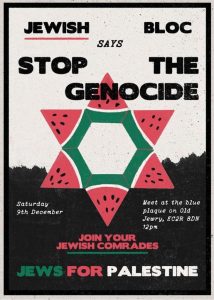
The watermelon, which has the colours of the Palestine flag, has been used to symbolise Palestinian solidarity where the flag itself has been banned. Again, the leaflets were eagerly grasped by demonstrators and we quickly ran out of copies.
But aside from our nervousness about the marches, we feared that post-October 7 both anti-semitism and Islamophobia would rise, and relationships between Jews and other minorities would be tested. Both Jewish and Muslim organisations are reporting an alarming rise in hostile incidents, including physical assaults.
And the anti-semitism since October 7 has not only come from the right; some people on the left, reaching for simplistic explanations, have made crass assumptions about Jews, which progressive Jews continue to challenge. Nevertheless, the idea that London’s Jews should so fearful that they need to close Jewish schools, that graffiti saying: “Palestine will be free” or a Palestinian flag hanging from a traffic light are anti-semitic, was at best overblown and at worst, smoke and mirrors. In fact three schools closed for one day.
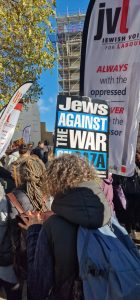
It is still too early to gauge the impact on solidarity between minority communities, but despite the attempt to taint Palestine demonstrations as “hate marches,” it’s on those very protests that relationships between Jews, Muslims and other minorities are being cherished and strengthened, as Ben Jamal, director of the Palestine Solidarity Campaign in Britain, describes: “Those trying to delegitimise the huge protests claim that our marches are making the centre of London a no-go area for Jewish people. The presence of many hundreds of Jewish comrades who have marched on each demonstration in a bloc undermines such claims and also undermines the anti-semitic trope that all Jewish people identify with Israel and stand with it in its oppression of the Palestinian people. Those filling the Jewish bloc know that the struggle against all forms of racism, including anti-semitism, Islamophobia and Israel’s system of apartheid, are indivisible. It is on those principles that they march and are warmly welcomed by their fellow marchers.”
The largest mobilisation for Palestine so far was on Armistice Day, November 11. A vibrant, multicultural mass marched from Hyde Park to the US embassy — a route far away from preparations for the official Remembrance Day events at the Cenotaph. The Establishment roundly condemned a march demanding a ceasefire on Armistice Day!
On that day, though, the 1,000-strong Jewish bloc, with drummers, a sea of banners, and hand-made placards, completely filled a wide street between Belgrave Square and Grosvenor Place, ready to join the march as it went past. The bloc’s first joint leaflet with its striking design was enthusiastically snapped up. It asserted that we were there:
• To join the hundreds of thousands mobilising for the freedom of the Palestinian people, and for a better future for everyone living in Palestine and Israel
• Because the Jewish experience of racism and our liberatory traditions impel us always to fight against oppression and always to act in solidarity with the oppressed
• Because the people who define themselves as our community “leaders” are not here.
Before crossing the Thames at Vauxhall Bridge, the bloc stopped and lined up on the pavement. Marchers came over to hug and greet us, open conversations, and pose for selfies in front of Jewish banners. It was heartwarming and uplifting.
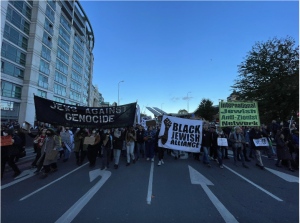
Two weeks later we gathered in Grosvenor Square for the next national march, conscious that the following day, a very different march would assemble in central London advertising itself as “against anti-semitism.”
Many Jews probably joined it, believing that it was what it claimed. But it was organised by the misnamed Campaign Against Anti-semitism (CAA) which, for several years, has attempted to align Jews with Islamophobic Tories and hard-right zionists. It occasionally exposes neonazi individuals but its major emphasis is on libelling critics of Israel’s policies and/or zionism as anti-semites.
It feigns embarrassment when Tommy Robinson promotes its events but that’s hardly surprising since they both peddle the same Islamophobic lies about so called “hate marches.” The CAA’s march “against anti-semitism” concluded with Israel’s national anthem, the Hatikvah, and God Save the King — neither of them the Jewish bloc’s choice of Desert Island Discs.
The Jewish bloc’s leaflet, a day before the CAA march, attacked selective anti-racism, saying: “We reject any attempts to divide us from others who are fighting oppression.” Jewish Socialists’ Group members addressing pro-Palestinian sixth-formers have argued that to condemn anti-semitism but stay silent on Islamophobia, is not an expression of anti-racism, but neither is it anti-racist to attack Islamophobia while letting anti-semitism pass. They have urged young people not to fall for conspiracy theories and to be aware of the hundreds of dissident young Israelis who are defying their murderous government by burning their military call-up papers.
The consolidation of an intergenerational Jewish bloc in London has been an exciting and necessary initiative in the bleakest times. Its success so far has been achieved through a commitment to democratic organising on core principles and unity in action without demanding uniformity of thought.
Ezra, early-thirties, and Ruth, mid-sixties, exemplify that cross-generational co-operation. Ruth says: “No-one in my family has mentioned Gaza to me in the past two months. Partly because our views are so far apart that no-one wants to rupture our relationship. We on the Jewish left have watched the ethnic cleansing in the Occupied Palestinian Territories for many years and knew this all-out slaughter was inevitable.
“But if you believe Israel is a fundamentally democratic, liberal nation, albeit with one or two religious extremists, the past few weeks are too shocking to absorb.”
Ezra’s secular family are “proud that I’m standing firmly against racism — yet they’ve also been made to feel unsafe by the dominant zionist discourse that intentionally takes advantage of our very real trauma. My family have been made refugees multiple generations in a row, so my parents aren’t able to take life in Britain for granted.
“Growing up, a large part of my sense of Jewishness was around loss: of people, places, languages. At 18 I learnt about Israel from Jewish friends who were already critical. So there was nothing to unlearn. The more I’ve learnt, the more diasporist and pro-Palestine I have become! I’ve been lucky to find an intentionally Jewish community engaged with a set of traditions and ethics which are alive and evolving.”
Both are highly critical of “official” Jewish bodies, including recent initiatives like the CAA. Ruth asks: “Who do they represent? Not those whose lives have been decimated by austerity. Not the thousands of Jews who are secular and whose lives don’t conform to an idealised Jewish family. Not the many thousands who are anti-zionist.
“An extreme right-wing pro-zionist leadership now demands complete obedience to whatever message Israel puts out. They have also been shamefully complicit in stirring up Islamophobia in the UK by constantly telling our community that anyone — particularly Muslims or the left — is a threat to their safety. Community leaders would rather share platforms with a succession of racist Tory home secretaries than have meaningful dialogue with other minority representatives in the UK.”
Ezra sees the CAA as “a deeply racist organisation,” which actually undermines the fight against anti-semitism and other racism. “Aligning ourselves to white supremacy, and peddling Islamophobia is not going to reduce anti-semitism. It also endangers the lives of other racialised groups. Anti-semitism is racism, and can only be challenged as part of a much larger struggle. As Jews we must always stand on the side of the oppressed.”
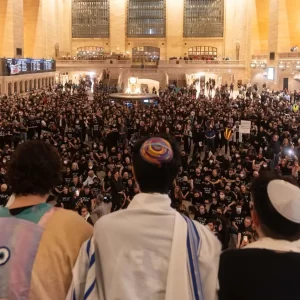
Just one example of Jews internationally organising for Palestine; Jewish Voice for Peace take over Grand Central Station in New York. (pic JVP)
It won’t be easy to consolidate and sustain this initiative, which is emerging out of a wider Jewish community itself in flux, and a left that has been battered by weaponised accusations of anti-semitism, but it is happening. Across Britain — in Edinburgh, Glasgow, Manchester, Brighton, Bristol and elsewhere, as well as in London — Jews are joining together in solidarity with the Palestinians.
A Jewish bloc Friday-night meal was packed out with Jews of every generation bringing experiences from many communal, cultural, religious and political traditions. It was buzzing with conversation, music and dancing — the stuff of human communication which must form the foundation of a radical community that can engage not only with the destruction of lives and any prospect of a shared future in Palestine and Israel, but equally with fighting rising racism and fascism here in Britain.

Thanks to Julia and David for celebrating the growing awakening of Jews critical of Israel’s murderous government. But how disappointing that in an article about growing unity, only two Jewish groups are mentioned. I’ve today been on a Jewish bloc within the weekly Leeds ceasefire march, uniting members of JVL, Na’amod, Zeudah Leeds queer Jewish collective, and individuals not involved in any of those. I cannot share this article with them because it dismisses by omission all these other organisations that have also existed since before October. I long for discussion of how best to engage in developing this current Jewish expression of solidarity with the oppressed, and this current disgust with Israel’s pretensions to represent Jewish tradition. When and how to approach synagogues, mainstream Jewish cultural organisations, and Jewish individuals not yet involved? Now is clearly a time at which these approaches can be made more than most times Which issues to make fundamental in these discussions, if any beyond immediate ceasefire, and which to encourage diversity on? What educative roles do each of the non-Zionist organisations bring to the table of solidarity with Palestinians and demands for a ceasefire? What have been the discussions at national level between the different organisations currently in the Jewish Bloc, which those of us outside London can learn from and contribute to? there is so much more to positively celebrate and learn from!
Solidarity!
It’s great to hear what’s happening in London, but it’s also important to get the message out elsewhere. In most towns and cities, there aren’t enough left wing Jews to form a local Jewish Bloc, but that doen’t mean we should either stay at home when local demos are organised, or just go along with everyone else and not identify as Jewish.
Here in Nottingham, we’ve tried to ensure that every demo has at least one Jewish speaker and when we’ve started off by saying that we’re Jewish and that all Jews don’t support Israel, this has been greeted with cheers and applause every time. When we’ve finished, people – and especially young Muslims – come up to shake our hands.
You don’t have have a long speech prepared: just say you’re Jewish and always stand with the oppressed, never with the oppressors and that’ll be enough!
Great to hear about the organised Jewish presence in places other than those mentioned in the article. Our piece was written to a tight deadline and we needed to cut several hundred words from our draft – so the focus was on the activities we did collectively and perspectives we shared. Rather than listing/describing each of the individual groups. In the print edition we were very pleased that the Morning Star used pics from Edinburgh and Manchester as well as London!
So heartening and welcome to read this. I’m not Jewish but am a fervent supporter of Jewish Voice for Peace, but since their actions are in the US it’s easy to feel isolated in the UK, especially in Pembrokeshire where pro-Palestinians are thin on the ground.
To large credit, many people have marched in solidarity with beleaguered Palestinians.
The Jewish bloc represents a positive step.
It unites critical Jews in multiple UK regions who demand a Gaza immediate ceasefire.
But Netanyahu vows to continue his war slaughter for countless months ahead.
As thousands more die, amid the constant bombs and aid siege, rallies need a boost.
The bloc could maximise cooperation with gentiles who make the same urgent call.
Six million voters remain unsure about their support at the next general election.
Indeed one perhaps set for the spring.
Significant constituencies include enough Muslims or Jews to influence the outcome.
This offers potential clout that could force Starmer to call a halt on the IDFs carnage.
With Islamic and different groups, the bloc might help run campaigns in these seats.
Change looms on evidence that ceasefire backers may cost Labour dear at the polls.
The government in turn would face pressure to follow suit, or suffer losses.
And pressure grows amid the coming presidential fight in the US, israel’s big ally,
Climbdowns here would send timely warning shots across Washington’s bows.
Can you tell me how to get information about jewish blic . I will be com8ng to London from Sheffield fir demo on 13th
WE will publish information here on how to join the bloc on the 13 January march as soon as the details are agreed
There are Inter-Faith groups in cities which MAY help lone individuals (from Jewish or other faiths) find like-minded companions to work with when trying to stop the genocide in Gaza.
These groups have often worked together for 20 plus years on interfaith relationship-building and on initiatives of common concern (eg anti-poverty and services to asylum-seekers and the homeless). Individuals within them know well and trust their opposite numbers in Muslim, Hindu, Sikh, Jewish and Christian communities, etc. They know the particular strengths and assets of different “congregations” (our local Sikhs are the “go to” community for organising any joint initiatives to feed the city’s destitute, for example).
Could a local Interfaith Group help lone individuals increase their impact in planning local activities to stop the killings in Gaza and change the “hearts and minds” of local politicians?
I arrived here via Alexei Sayle’s Christmas message and in that, along with this I find something I can align with as a secular Jew who has been attending the London marches.
At the risk of stating the obvious, open hearted sentiments like this have been pretty thin on the ground in the news lately.
Thank you!